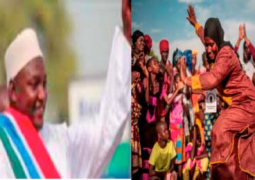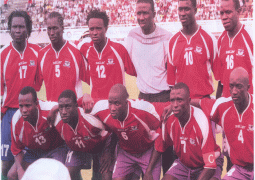The government of The Gambia wishes to bring to the attention of Gambians in particular and the international community including the EU in general that The Gambia attained Independence on the 18 February 1965 thereby bidding ADIEU to colonialism, subjugation and humiliation that spanned 400 years.
During the 400 years of colonial occupation and misrule, the Gambia lost everything that was necessary for her development ranging from flora and fauna to youths i.e. energetic young men and women who were captured and forced into slavery.All this looting of animals, precious plant species, energetic men and women in their prime, mineral and agricultural resources, water resources and sale of our land were part of a calculated European Agenda to impoverish the African continent and turn dignified and wealthy Mother Africa into a continent of the wretched.
The Gambia was a very large and wealthy kingdom where elephants roamed in their thousands since creation or for millions of years in addition to other exotic wild life species like giraffes, lions, cheetahs different types of dear and antelopes zebras, ostrich, hippos, lions, rhinos just to name a few. The
It was this lucrative trade in Ivory that attracted the English or colonial
At independence in 1965, strangely enough those Gambian leaders accepted being given a lizard of a country as an independent unviable state instead of the elephant Giant of a country that they came to occupy 400 years before. Gambians preferring independence to bondage, accepted the loss of their land and settled for what was left of the homeland as the Republic of the
If the Independence of little Gambia as a sovereign state on the 18th of February 1965 was in doubt, the advent of the July 22nd 1994 Revolution buttressed and exemplified Gambia’s total independence as a sovereign dignified albeit small state that will never be colonized again.
Unfortunately for some outside powers, especially the EU, they don’t seem to see that little poor Gambia will never be anybody’s colony in whatever form and certainly not after 18 years of revolutionary reconstruction and unprecedented development. Our 18 years development cannot be matched to any development of any kind during the 400 years of British and European occupation and misrule of The Gambia.
These facts being the case, GOTG considers it as an insult to our sovereignty, dignity, culture and our religion the agenda being imposed by the EU with time lines for implementation by this administration under the pretext of Article 8.
This sinister agenda is intended to cause the following effects:
1. Make criminals lords over all the law abiding citizens as they will be rewarded for their criminal activities whilst law abiding Gambians are punished by being at the mercy of criminals;
2. Turn the Gambia; a Muslim country, into a sinful, abominable and Allah disobeying country by allowing the children of Satan, the biggest threat to human existence, otherwise called homosexuals walk the streets of the Gambia freely.Homo-sexuality is not only satanic, but a serious danger to human existence as they disobey Allah’s orders to Adam and Awa to procreate and inhabit the Earth.
The future of this country or any other country of human being created by Allah, would be seriously jeopardized and threatened if babies fail to be produced. The Human race would be extinct if we stop procreation by allowing these satanic children (Homo-sexuals) any little space in our pure and dignified Muslim country.
3. Destabilize the country and destroy our livelihoods and all the achievements we made painstakingly over the last 18 years.
4.Loose our dignity and self esteem as an Independence and dignified African country by having our laws that reflect the wishes and aspirations of this Muslim nation based on our culture but more importantly our religion, to be replaced by laws imposed by an alien culture that do not believe in our religion, culture and more importantly Allah’s existence.
All these insults and arrogance just for the sake of chicken change called AID or Development Assistance.As a Muslim country, we believe and put our destiny in Allah the Almighty, the one and only supreme Authority for Mankind, Lord of the worlds and Only HE is worthy of being worshipped and obeyed; not to the European Union or any western or Eastern power that exists or will exist on this Earth.
Dangling Aid over our heads as enticement for us to be lured into losing our dignity, offend Allah and be re-colonised is both immoral and insulting not only to Gambians in particular but Africans in general, taking into account the fact that the wealth of Europe today was due to the merciless looting and pillaging of Africa and her resources for more than four centuries.
The
The EU should rather explain to the
If the EU believes in what they are proposing to the Gambia why are Africans being not only Arbitrarily deported for no reasons other than being blacks on a daily basis and end up not only being destitute but become insane as a consequence. Are Blacks not human beings that should have the right to go to
We Africans would not come to your continent today and bother you, if you Europeans stayed in your continent yesterday. The government of The Gambia is making it abundantly clear that Homosexual will not be entertained on Gambian soil for whatever reasons as our culture and our religion forbid such decadent and abominable behaviours detrimental to human existence.
However, the EU is welcome to give all Homosexuals, visa free entry to EU member-states and as well as permanent residency therein. This will allow the EU to give them better protection and freedom they yearn for since they speak the same language and share the same belief.
For the information of the Gambian populace the following are the items propose to be imposed for implementation by the
Concrete benchmarks and timelines – reinforced Article 8 dialogue
“The EU has express its concern over what it views as a significant deterioration in the human rights situation in The Gambia in recent months, notably the execution of nine death row inmates, the closure of media organizations, and the arbitrary arrest and detention of journalists and human rights defenders.
In view of these events, and in addition to a persistent lack of progress made on the commitments undertaken by The Gambia at successive Article 8 meetings, the EU considers that a phase of Intensified Political dialogue with the Government must be launched. This process, foreseen in Article 8 (8) and Annex VII of the Cotonou Agreement, precedes consultations under Article 96 of the Agreement.
Under Intensified Political dialogue, specific benchmarks serve as mechanisms for reaching targets with regards to human rights, democratic principles and rule of law, through the setting of intermediate objectives and time frames for compliance. The draft list of possible benchmarks and timelines below are the EU’s proposals for discussion during the next Article 8 meeting:
Freedom of Expression/Media
The EU asks that the Government confirms its commitment to allow the free operation of independent media in The Gambia. This should reassure media stakeholders that as long as the media adheres to the laws of The Gambia, the Government guarantees that they will not be arbitrarily closed and that any closure will be notified by court order as required by law.--1 month
The EU asks that restrictive barriers (monetary/regulatory) to registration and licensing of the media should be removed. In particular:
• Provision in the Newspaper Act 1994 (amended) should be revised to allow:
Free of charge registration of print and broadcast media
Automatic registration of any print and broadcast media as long as prerequisite information is provided.
• The provision in the Information and Communication Act 2009 should be revised to ensure that the power to suspend, revoke or amend the terms and conditions of a license lie with an independent authority.-6 months
Freedom of Expression/Media
In line with The Gambia’s obligations under Article 19 of the International Covenant on Civil and Political Rights and Article 9 of the African Charter on Human and Peoples’ Rights, whereby State Parties are obliged to respect individuals’ rights to freedom of opinion and expression, the EU asks the following:
(i) A removal of restrictions on accessing and sharing information electronically which should translate in the unblocking of online media. -1 Month
(ii) A revision of the provisions in the Criminal Code that allow for prosecution on the charges of “sedition, libel, false publication or false information to a public servant”, and which impose prison terms and/or fines. -6 months
(iii) Revision of laws on freedom of expression and media regulation, such as those laid down in “Article 19” report “the Gambia: analysis of selected laws on media-overview” (April 2012 prepared in the framework of the EU/The Gambia NSA program and provided to Government during last Art. 8 meeting June 2012). -within 24 months
Death Penalty
The European Union recalls the commitments made by the Gambian authorities to the international community, including to the EU in the framework of the Cotonou Agreement Art. 8 political dialogue, to consider transforming a then de facto moratorium on the death penalty into a de jure one, most recently in June 2012.Successive UNGA resolutions on the death penalty have called on all countries to progressively restrict its use and to reduce the increasing number of offenses for which it may be imposed. UN standards are accepted by an ever increasing number of countries, including in
The Human Rights Committee also stated in its General Comment No. 6 that even though “states parties are not obliged to abolish the death penalty totally they are obliged to limit its use and, in particular, to abolish it for other than the “most serious crimes”. The committee noted further in the same general comment that “the expression “most serious crimes” must be read restrictively to mean that the death penalty should be a quite exceptional measure”. All general comment adopted by the Human Rights Committee are binding on The Gambia. The EU therefore proposes the following actions to be undertaken:
That the Government maintains the reinstated de facto moratorium on the use of the death penalty. -Immediate
That the Government provides information regarding the recent executions, including the location of the place of burial to the families of the victims, in line with Article 7 of the ICCPR2. -1 month
Freedom of Expression/Media
That a full and transparent review of the death penalty by the National Assembly, including clarity on the method of execution takes place as required by the Gambian Constitution (Section 18 (3). -12 months
Depending on the review by the National Assembly, propose to introduce a de jure moratorium on the use of the death penalty. -24 months
The provisions for the death penalty in the elements of the criminal code and other laws should be reviewed and eventually removed for those who do not correspond to Article 6 (2) of the ICCPR which provides that “death penalty sentences may be imposed only for the most serious crimes…” and in accordance to general Comment No. 6 the Human Rights Committee which states that “the expression” most serious crimes” must be read restrictively to mean that the death penalty should be a quite exceptional measure;
6 months
•Treason – Section 35 of the Criminal Code
•Murder – Section 188 of the Criminal Code
•Aiding the enemy – Section 36 of the Gambia Armed Forces Act
•Offences by person in command when in action – Section 37 of the Gambia Armed Forces Act
•Offences relating to security – Section 38 of the Gambia Armed Forces Act
•Offences relating to prisoner of war – Section 39 of the Gambia Armed Forces Act
•Acts of terrorism – Section 3 (1) of the Anti-Terrorism Act
That the Government sign and ratify the Second Optional Protocol to the International Covenant on Civil and Political Rights. -18 month
Access to Prisons
The EU asks that the government concludes a Memorandum of Understanding with the ICRC to allow for the ICRC access to prison facilities on a regular basis, and for these visits to take place according to ICRC standards. -3 months
The EU also asks that the government to provide regular and timely access for diplomatic corps, including private interviews and the right to conduct meetings in their native language. -1 month
The government, in partnership with the ICRC, should present coasted proposals to improve prison/detention facility conditions, to be brought further into line with international standards, and budget accordingly. -within 12 months
The
The EU asks that the government to sign and ratify the Optional Protocol to the CAT. -6 months
Human Rights
It was agreed with the Commonwealth Secretariat to establish a Human Right Commission. The Commonwealth has started working with the GoTG on this. A meeting of all relevant stakeholders was held in
Following the preparatory meeting of relevant sectors on Government of The Gambia/EU Article 8 political dialogue during which the EU presented conditionalities for The Gambia Government to meet within a certain time frame, the Office of the President wishes to make it clear that it does not accept such impositions as regard its domestic matters. The Gambia Government, therefore, condemns any attempt to interfere with the internal affairs of the country, especially those dealing with the implementation of the domestic laws which have been enacted and accepted by the Gambian people and passed by its legislature.
The government of The Gambia considers such impositions as an infringement on its rights as an independent and sovereign nation and as an equal member of the Human Race. The government categorically rejects this development and calls for an immediate cessation of attempts to meddle in the internal political affairs of the country. The




